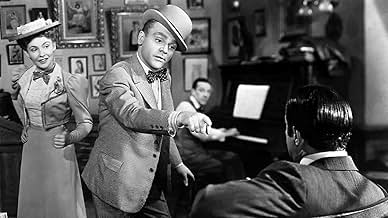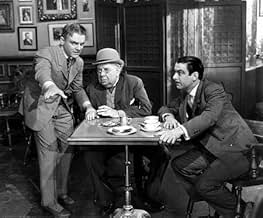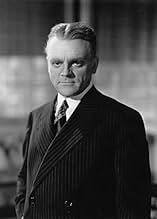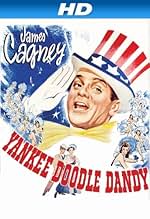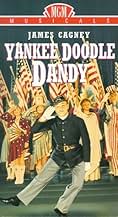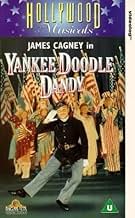The life of the renowned musical composer, playwright, actor, dancer, and singer George M. Cohan.The life of the renowned musical composer, playwright, actor, dancer, and singer George M. Cohan.The life of the renowned musical composer, playwright, actor, dancer, and singer George M. Cohan.
- Won 3 Oscars
- 9 wins & 6 nominations total
Patsy Parsons
- Josie Cohan - As a Girl of 12
- (as Patsy Lee Parsons)
Featured reviews
James Cagney put down his tommy gun and grapefruit long enough to register his lone Oscar-winning performance in one of Hollywood's most enduring biopics, playing song-and-dance man George M. Cohan with so much gusto it's hard to believe the filmmakers wanted Fred Astaire, or that Cagney ever did anything else but musicals. Cohan himself probably didn't make as good a Cohan as Cagney does here.
The film is best-known for its musical moments, not only because of Cagney's clever hoofing but for the way the numbers are staged. When Cohan debuts his new song "You're A Grand Old Flag," the picture goes from being a relatively straight stage shoot to a series of logistically-improbable montages (a group of Boy Scouts give way to Revolutionary War troops, which melt into a knot of freed slaves gathered around a statue of Lincoln) that sell the history of the United States in all its glory. Finally, as the song winds to its big finish, hundreds and hundreds of uniformed flag bearers spill out on a stage suddenly too big to hold any conventional theater.
The overall effect of this is overwhelming enough to make you want to run out and buy War Bonds 60 years after the conflict "Yankee Doodle Dandy" was inspired by has ended. Patriotism may go out of style from time to time, but events happy and otherwise have a way of bringing it back.
The smaller touches make "Yankee Doodle Dandy" as entertaining as it is inspiring. Little Georgie gets too big for his britches when he tells a Brooklyn audience he can lick any kid in town, and gets put to the test. Older George and a partner beguile a producer (played by S.Z. Sakall, Carl from "Casablanca") into taking on a play no one else wants by pretending it's a hot property. George meets his future wife Mary in old-man costume, and can't resist having a little fun with her. "I know I have talent," Mary blurts, "even if I am from Buffalo."
Cagney does talk rather fast, and he needs to if only to keep pace with a frenetic storyline. Situations change rather quickly in "Yankee Doodle Dandy," and sometimes, as with George's sudden success and the later dissolution of the Four Cohans, it happens a bit too fast to follow. Cagney hardly pauses for breath. He's no singer, either, talking his way through his numbers like Rex Harrison in "My Fair Lady," only not as well.
But few films deliver the goods like "Yankee Doodle Dandy." You get a strong feeling for vaudeville entertainment, how mass entertainment worked in the gaslight age. The musical numbers (all done within the context of public performance, or else rehearsal, i.e. naturalistically) have real charm. The dialogue is great, too, a trifle canned and buffed-up maybe, but very Runyon-ish in its Stage Door Johnny way.
The best scene, for Cagney's acting and for comedy, is when he shows Mary a new song he wrote for her. The way his eyes move from her face to the score, prompting her unnecessarily, reveals both affection and the showman's inner ham. He almost looks menacing, but of course it's because he's smitten by the singer and trying to tell her through his song. It also sets up a great bit of comedy later on when George has to give Mary's song away to stage star Fay Templeton, then go back and explain it to Mary.
"He's the whole country squeezed into one pair of pants," exclaims one producer trying to get Templeton to hitch her wagon to Cohan's star. With Cagney wearing the pants, the end result is a perfect fit.
The film is best-known for its musical moments, not only because of Cagney's clever hoofing but for the way the numbers are staged. When Cohan debuts his new song "You're A Grand Old Flag," the picture goes from being a relatively straight stage shoot to a series of logistically-improbable montages (a group of Boy Scouts give way to Revolutionary War troops, which melt into a knot of freed slaves gathered around a statue of Lincoln) that sell the history of the United States in all its glory. Finally, as the song winds to its big finish, hundreds and hundreds of uniformed flag bearers spill out on a stage suddenly too big to hold any conventional theater.
The overall effect of this is overwhelming enough to make you want to run out and buy War Bonds 60 years after the conflict "Yankee Doodle Dandy" was inspired by has ended. Patriotism may go out of style from time to time, but events happy and otherwise have a way of bringing it back.
The smaller touches make "Yankee Doodle Dandy" as entertaining as it is inspiring. Little Georgie gets too big for his britches when he tells a Brooklyn audience he can lick any kid in town, and gets put to the test. Older George and a partner beguile a producer (played by S.Z. Sakall, Carl from "Casablanca") into taking on a play no one else wants by pretending it's a hot property. George meets his future wife Mary in old-man costume, and can't resist having a little fun with her. "I know I have talent," Mary blurts, "even if I am from Buffalo."
Cagney does talk rather fast, and he needs to if only to keep pace with a frenetic storyline. Situations change rather quickly in "Yankee Doodle Dandy," and sometimes, as with George's sudden success and the later dissolution of the Four Cohans, it happens a bit too fast to follow. Cagney hardly pauses for breath. He's no singer, either, talking his way through his numbers like Rex Harrison in "My Fair Lady," only not as well.
But few films deliver the goods like "Yankee Doodle Dandy." You get a strong feeling for vaudeville entertainment, how mass entertainment worked in the gaslight age. The musical numbers (all done within the context of public performance, or else rehearsal, i.e. naturalistically) have real charm. The dialogue is great, too, a trifle canned and buffed-up maybe, but very Runyon-ish in its Stage Door Johnny way.
The best scene, for Cagney's acting and for comedy, is when he shows Mary a new song he wrote for her. The way his eyes move from her face to the score, prompting her unnecessarily, reveals both affection and the showman's inner ham. He almost looks menacing, but of course it's because he's smitten by the singer and trying to tell her through his song. It also sets up a great bit of comedy later on when George has to give Mary's song away to stage star Fay Templeton, then go back and explain it to Mary.
"He's the whole country squeezed into one pair of pants," exclaims one producer trying to get Templeton to hitch her wagon to Cohan's star. With Cagney wearing the pants, the end result is a perfect fit.
So it takes liberties with facts. So it's jingoistic. Big deal! I adore it for its depiction of turn-of-the-(20th}century New York, especially its theater, which has fascinated me for years. And it has the breath-taking performance of Jimmy Cagney in the title role; he's absolutely elecrifying in the musical numbers. If some scenes are mawkish, well, I think that can be forgiven.
This movie, above all others, make me so proud to be an American.
This movie, above all others, make me so proud to be an American.
Right from the start, I have to say you do not need to be an American to be caught up in the excitement of the blatant flag waving tribute to a great artist. "Yankee Doodle Dandy" made to boost morale after the U.S. entered the war surely would have achieved its goal. It would have been even better in Technicolor (not the coloured version later shown). The songs were great, the acting and the individual dancing style of James Cagney was superb and deserved the Oscar. The two scenes featuring "Over There" were very moving with Frances Langford a standout! The story, while bearing small resemblance to real life, was good and Walter Huston and Rosemary de Camp were excellent. When you see a film such as this some 60 years after its release, and still really enjoy it, it shows how the Golden Years of Hollywood were just that.
`It seems it always happens
Whenever we get too high hat and sophisticated for flag-waving, some thug nation decides we're a pushover, all ready to be blackjacked. It's not long before we start looking up mighty anxiously to make sure the flag is still waving.'
So says James Cagney, as George M. Cohan, at the time of the sinking of the Lusitania in 1915. Obviously, it's a sentiment that has great relevance to our time, as well. I've always wished I could dance a patriotic dance or march down the street waving the flag. It looks like a lot of fun. The trouble is, this sort of activity is often performed to suppress what America is really about. The really great thing about our country isn't songs, flags and marches. Any country can do those things. The real great thing is that we have the right to say what we think, to debate the issues of the day and to form a consensus for action when we are in agreement about what needs to be done.
There was surely such a consensus when this film was made in 1942. There was little doubt about what needed to be done then. However, World War I seems now a particularly pointless conflict and the thought that smiling Frances Langford was singing soldiers into battle to who knows what fate is a little disturbing. And now, whenever there is a war, we are urged to join the parade and postpone debate until the issue is something not so important, like farm prices or college entrance requirements. It seems to me that the more important an issue is, the more we should be debating it. If people are going to die, we'd better make sure we are right.
From that point of view, `Yankee Doodle Dandy' can seem almost offensive. But, of course it isn't. Is a charming example of one of the thing Old Hollywood did best- the romantic biography. In this George M. is an all-right guy, an enormous bundle of energy that intimidates the stuffed shirts but causes people of substance to fall in love with him. He has a wonderful family and one of those `perfect' Hollywood wives- Mary, who doesn't even wince when he gives the song he wrote for her to another actress. He has a loyal friend and partner in Jed Harris. For some reason he's childless but still gets a thrill from performing for his beloved audiences. And, when his country needs a shot in the arm, his enthusiastic songs provide it.
Of course, he was married twice. His divorce from his first wife Ethel, was acrimonious and thus she doesn't appear in the story. `May' is a fictionalized version of his second wife Agnes. He had children but they also didn't make the cut because he was estranged from them at the time of the film. He was loathed by many of his profession for years before this because of his strong anti-union stance. His split with Jed Harris was not the gentle retirement we see here but was, at least in part because Harris had given in to the unions. And he himself loathed Franklin Roosevelt, refusing for four years to pick up the medal FDR and Congress had awarded him. Would it have been a better movie if these things were incorporated into the script? Probably not. Hollywood- and the nation at the time- was more concerned with the way things should have been than with the way they actually were.
Cagney was surely a perfect choice to play Cohan, being an Irishman who enter show business as a song and dance man, (and always considered himself primarily that). His exuberant personality also mirrors that of Cohan, who was said not to be particularly great at anything but did everything with such enthusiasm that it didn't matter. That said, I have never been a particular fan of Cagney's `puppet on a string' dance style. Dancing is supposed to be an expression of one's inner self. A puppet has no inner self.
There are many charming sequences in the film, none more so than the `cute-meet' with Mary where he's played a dottering old man in a play and she thinks he really is one until he starts showing her dance steps. Then there's his refusal by the Army because of his age. He does another dance routine to show them what they are missing. You've got to love the sequence where he and Harris, (Richard Whorf), con Cuddles Zakal into backing them. Then there's a glimpse of Cagney cute sister, Jeanne, playing Josie, Cohan's sister. We are not told why Josie is `gone' late in the film- her heart attack at age 36 was deemed too unpleasant, as was the death of Cohan's mother, (Rosemary Decamp, who was more than a decade younger than Cagney). The one death scene is that of Cohan's beloved father, played by Walter Huston, who was a Cohan protégé. Chan himself was on his deathbed as this was released, (he submitted a script which was `tactfully rejected'). He escaped his nurse to see it in a theater and gave it his approval, as we should, too.
So says James Cagney, as George M. Cohan, at the time of the sinking of the Lusitania in 1915. Obviously, it's a sentiment that has great relevance to our time, as well. I've always wished I could dance a patriotic dance or march down the street waving the flag. It looks like a lot of fun. The trouble is, this sort of activity is often performed to suppress what America is really about. The really great thing about our country isn't songs, flags and marches. Any country can do those things. The real great thing is that we have the right to say what we think, to debate the issues of the day and to form a consensus for action when we are in agreement about what needs to be done.
There was surely such a consensus when this film was made in 1942. There was little doubt about what needed to be done then. However, World War I seems now a particularly pointless conflict and the thought that smiling Frances Langford was singing soldiers into battle to who knows what fate is a little disturbing. And now, whenever there is a war, we are urged to join the parade and postpone debate until the issue is something not so important, like farm prices or college entrance requirements. It seems to me that the more important an issue is, the more we should be debating it. If people are going to die, we'd better make sure we are right.
From that point of view, `Yankee Doodle Dandy' can seem almost offensive. But, of course it isn't. Is a charming example of one of the thing Old Hollywood did best- the romantic biography. In this George M. is an all-right guy, an enormous bundle of energy that intimidates the stuffed shirts but causes people of substance to fall in love with him. He has a wonderful family and one of those `perfect' Hollywood wives- Mary, who doesn't even wince when he gives the song he wrote for her to another actress. He has a loyal friend and partner in Jed Harris. For some reason he's childless but still gets a thrill from performing for his beloved audiences. And, when his country needs a shot in the arm, his enthusiastic songs provide it.
Of course, he was married twice. His divorce from his first wife Ethel, was acrimonious and thus she doesn't appear in the story. `May' is a fictionalized version of his second wife Agnes. He had children but they also didn't make the cut because he was estranged from them at the time of the film. He was loathed by many of his profession for years before this because of his strong anti-union stance. His split with Jed Harris was not the gentle retirement we see here but was, at least in part because Harris had given in to the unions. And he himself loathed Franklin Roosevelt, refusing for four years to pick up the medal FDR and Congress had awarded him. Would it have been a better movie if these things were incorporated into the script? Probably not. Hollywood- and the nation at the time- was more concerned with the way things should have been than with the way they actually were.
Cagney was surely a perfect choice to play Cohan, being an Irishman who enter show business as a song and dance man, (and always considered himself primarily that). His exuberant personality also mirrors that of Cohan, who was said not to be particularly great at anything but did everything with such enthusiasm that it didn't matter. That said, I have never been a particular fan of Cagney's `puppet on a string' dance style. Dancing is supposed to be an expression of one's inner self. A puppet has no inner self.
There are many charming sequences in the film, none more so than the `cute-meet' with Mary where he's played a dottering old man in a play and she thinks he really is one until he starts showing her dance steps. Then there's his refusal by the Army because of his age. He does another dance routine to show them what they are missing. You've got to love the sequence where he and Harris, (Richard Whorf), con Cuddles Zakal into backing them. Then there's a glimpse of Cagney cute sister, Jeanne, playing Josie, Cohan's sister. We are not told why Josie is `gone' late in the film- her heart attack at age 36 was deemed too unpleasant, as was the death of Cohan's mother, (Rosemary Decamp, who was more than a decade younger than Cagney). The one death scene is that of Cohan's beloved father, played by Walter Huston, who was a Cohan protégé. Chan himself was on his deathbed as this was released, (he submitted a script which was `tactfully rejected'). He escaped his nurse to see it in a theater and gave it his approval, as we should, too.
There are many, many James Cagney films that show his enormous talent as an actor. He was equally at home in musicals, dramas and comedies. While I have always been a fan and appreciate his unusual scope, this movie in particular caught my eye and totally blew me away when the scene I'm about to describe unfolded.
Near the very end of the film Cagney's character (George M. Cohan) bids farewell to the President and leaves the room. There is a long, open staircase he starts walking down. As he walks you sense a bit of a bounce beginning to take over his step.....one that quickly gives way to an awesome dance as he navigates the stairway. Many will not note, but this dance was a fantastic achievement on two fronts. One, it was done in one "take"...that is, the camera never stopped; the scene never "cut." The camera stays with him in one shot all the way through. Second, Mr. Cagney never ONCE looks at his feet or down at the steps. It's almost impossible to WALK down a staircase without looking down or hanging on to a banister....this man DANCED down a staircase without benefit of seeing or touching anything.
Couple this feat with the brilliant display of "hoofing" he gives earlier in the film when he literally dances up the walls and you have a movie that deserves its "classic" rating. If you haven't seen it please make it a point to do so. Any movie that is awe inspiring 62 years later must be worth a peek, don't you agree?
Near the very end of the film Cagney's character (George M. Cohan) bids farewell to the President and leaves the room. There is a long, open staircase he starts walking down. As he walks you sense a bit of a bounce beginning to take over his step.....one that quickly gives way to an awesome dance as he navigates the stairway. Many will not note, but this dance was a fantastic achievement on two fronts. One, it was done in one "take"...that is, the camera never stopped; the scene never "cut." The camera stays with him in one shot all the way through. Second, Mr. Cagney never ONCE looks at his feet or down at the steps. It's almost impossible to WALK down a staircase without looking down or hanging on to a banister....this man DANCED down a staircase without benefit of seeing or touching anything.
Couple this feat with the brilliant display of "hoofing" he gives earlier in the film when he literally dances up the walls and you have a movie that deserves its "classic" rating. If you haven't seen it please make it a point to do so. Any movie that is awe inspiring 62 years later must be worth a peek, don't you agree?
Storyline
Did you know
- TriviaMany facts were changed or ignored to add to the feel of the movie. For example, the real George M. Cohan was married twice, and although his second wife's middle name was Mary, she went by her first name, Agnes. In fact, the movie deviated from the truth to such a degree that Cohan's daughter Georgette commented, "That's the kind of life Daddy would have liked to have lived."
- GoofsThe "You're A Grand Old Flag" number, supposedly takes place in the 1906 production of "George Washington Jr.," and uses multiple period flags to represent times before 1906. The Civil War flag, as an example, is correct for the time in question. However, in the final sequence characters carry, and an soft screen projection is made of, multiple 48 star flags. The 48 star flag was not introduced until 1912. In 1906, it should have been a 45 star flag. (Oklahoma was admitted to the Union in 1907, New Mexico and Arizona in 1912).
- Quotes
George M. Cohan: My mother thanks you, my father thanks you, my sister thanks you, and I thank you.
- Alternate versionsAlso available in a computer colorized version.
- ConnectionsFeatured in The Voice That Thrilled the World (1943)
- SoundtracksThe Yankee Doodle Boy
(1904) (uncredited)
from the Broadway Show "Little Johnny Jones"
Written by George M. Cohan
Played during the opening credits
Sung and Danced by James Cagney and Chorus
- How long is Yankee Doodle Dandy?Powered by Alexa
Details
- Release date
- Country of origin
- Language
- Also known as
- El canto de la victoria
- Filming locations
- Production company
- See more company credits at IMDbPro
Box office
- Gross US & Canada
- $11,800,000
- Runtime2 hours 6 minutes
- Color
- Aspect ratio
- 1.37 : 1
Contribute to this page
Suggest an edit or add missing content




